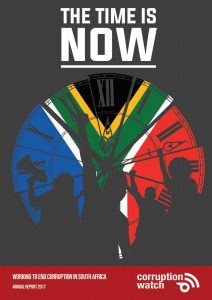
Umm Muhammed Umar
Corruption Watch received an all-time high number of reports of corruption within municipalities for the year 2020. Last Wednesday, the Organization released a third of its sectoral reports, focusing on corruption trends within municipalities. The report was titled ‘South African Needs Clean Hands’. Malusi Ncala, researcher at Corruption Watch, and the author of the report says that more than 33 000 reports of corruption had been received between 2012 and the end of 2020, at least 16% of which relate to local government. He said that this was important as this was actually the face of government – where people interact directly with officials, and with people that they have elected into those positions.
Speaking to Radio Islam, Ncala said that the top three on the list of corrupt activities that took place at municipalities related to the office of the municipal manager at about 34%, followed by local police or Metro Police at 30%. Next was the local Department of Housing. Ncala said that the types of corruption highlighted were bribery, procurement irregularities, employment irregularities, as well as embezzlement of funds.
Ncala said that the reports from smaller informal businesses about their goods having been confiscated and then having to bribe police officers to return their goods, involved Metro Police or local police authorities, and not so much the National Department. In these municipalities bribery seemed to be a big issue. He added that those were the kinds of issues that are being highlighted as much as abuse of power, or victimization of whistle-blowers. Police officers attempt to extort bribes from whistle-blowers, and were brutal in their handling of with whistle-blowers. More importantly, this also related to ordinary community members and motorists and others.
Not even the education sector has not been spared from employment irregularities. Corruption in terms of procurement when it comes to the food program, certification of teachers, the health sector, and vacancies designed to favour preferred candidates, all at a local level, largely concerns nepotism, or favouritism. Officials will have chosen people, and designed positions specifically to hire them. Ncala says this made it easier to flout processes. He said, “when it relates to food parcels, be it in schools or to communities now people find very creative ways to embezzle the system – they will either steal the resources that the state had provided, or they will return the goods to the enterprise where they bought them from so that they can get cash from them.”
Ncala said that the report was clearly about whistle-blower accounts. He said, “These are the most vulnerable people coming to Corruption Watch because they see no real intention from those who are in authority to do anything to curb the spread of corruption.” He added, “If anything, some of these officials are complicit. So, we have a leadership crisis.” He said that the only hope was to start from the people: people needed to start thinking about what kind of leaders they wanted – leaders with integrity, who were ethical, and with a social conscience.
Elections are not the only time to consider who we want our leaders to be. Ncala’s advice was that we should think beyond elections because we need to be participants in our democracy, at all times, thus enabling ourselves to hold people accountable.







0 Comments